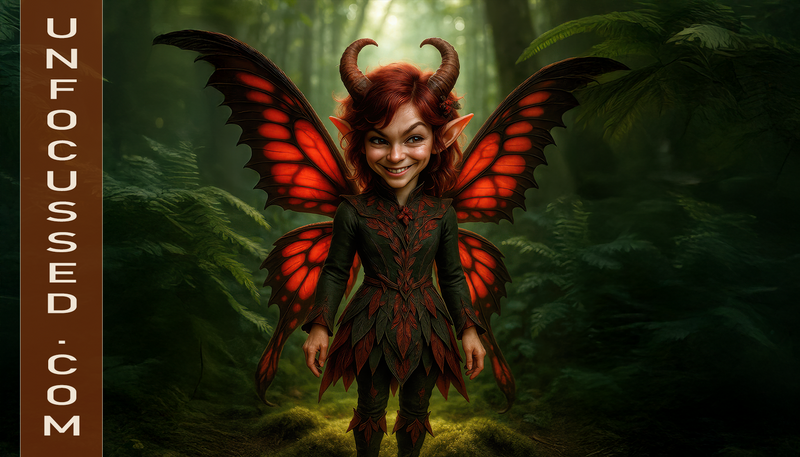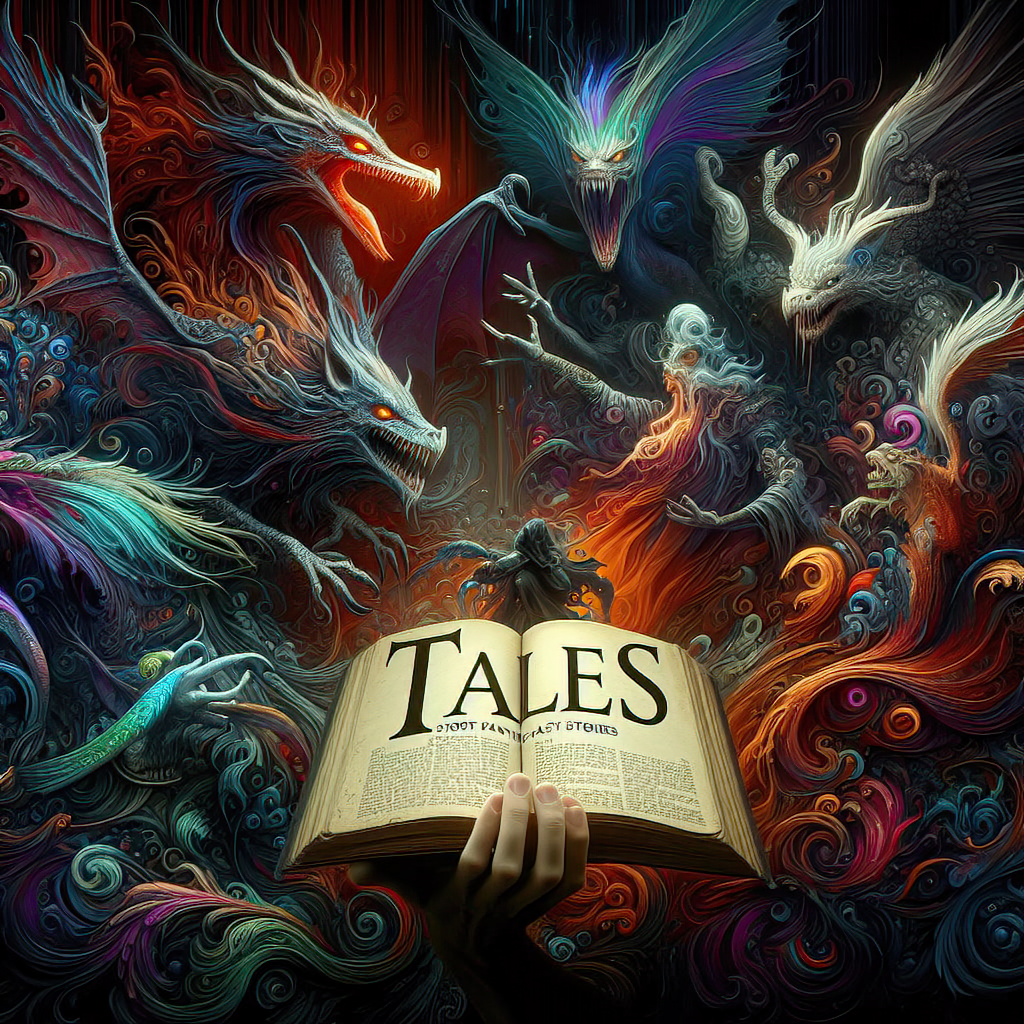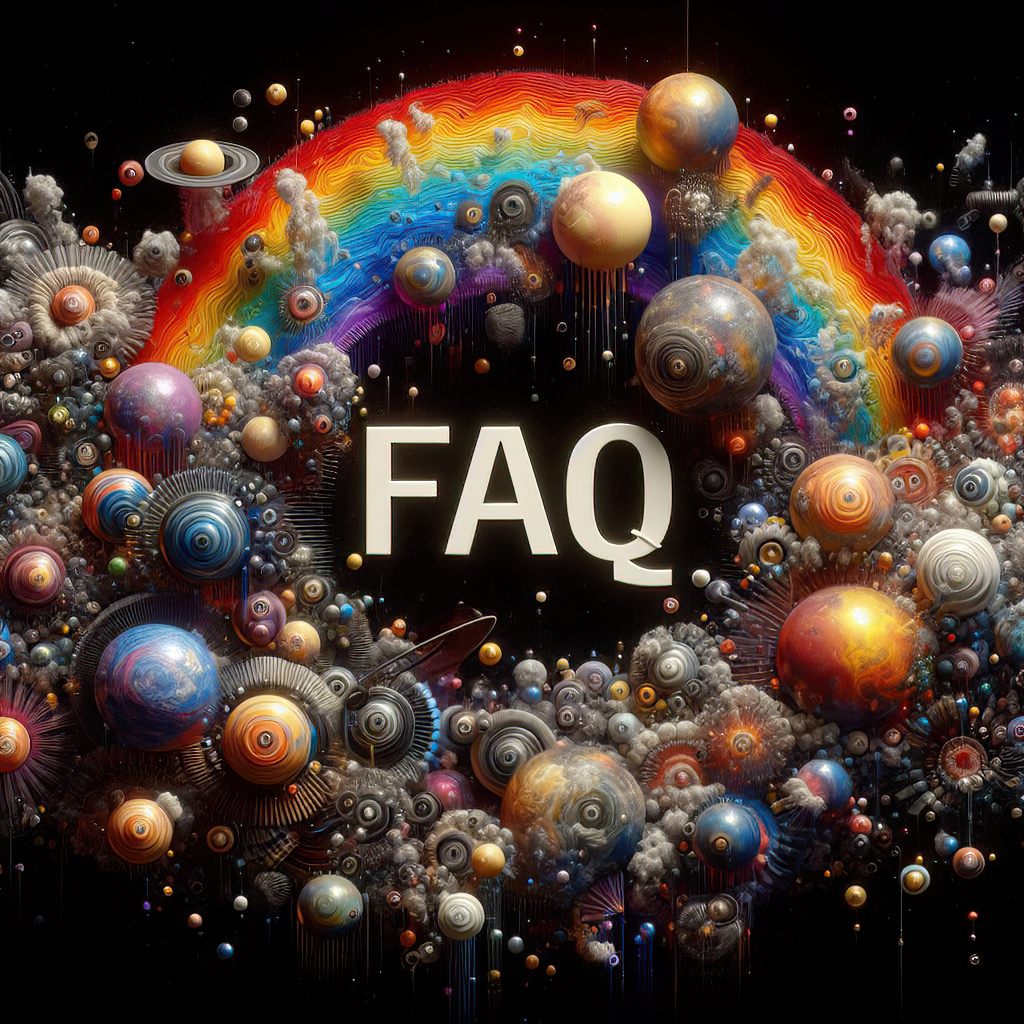
by Bill Tiepelman
Hope in Hooded Silence
Hooded, Not Humbled The fairy in question had a name, of course. But like all good woodland mysteries, she preferred it whispered. Call her "Hope" and she'll raise one sculpted brow; call her “The Hooded Sass Bringer” and she might offer you a smirk and a daisy chain laced with sarcasm. Hope did not flit. She did not twinkle. She strutted — slowly, like every blade of grass owed her an apology. Her wings were less “delicate flutter” and more “diamond-tipped declarations of sovereignty,” and that hoodie? Not a fashion statement — a full-blown rebellion. While other fairies wore translucent petals and glittery corsets, Hope wore pink with the energy of someone who could light up the woods, but chose passive-aggressive shade instead. She wasn’t brooding. No, no. She was strategizing. Perched on a mossy rock with a flower crown thrown haphazardly behind her, she looked like she'd just broken up with the Spring Equinox via scroll-text, and Spring was still sending her emotional saplings. She’d tried being “the sweet one” once — watered everyone’s mushrooms, whispered encouragement into lily buds, and kissed frogs just in case one was an investment banker. But one too many woodland creatures had mistaken her kindness for open scheduling. And one too many pixies had touched her snacks without asking. So now she sat there, radiant in her own right, booted feet crossed like an off-duty goddess, wings aglow with mild contempt, and a bouquet of not today. The mandala glowing faintly behind her? A passive ward spell. Repels toxic exes, clingy tree spirits, and any forest creature who utters “you should smile more.” “You know what’s magical?” she muttered to a nosy squirrel who’d just popped up behind her log perch. “A woman with boundaries and decent foot support.” The squirrel blinked. She blinked back. The squirrel slowly placed a pine nut near her boot and backed away like he’d just dropped tribute at the altar of a slightly unstable but very hot goddess. He wasn’t wrong. Hope leaned back, letting the petals brush her ankles, finally allowing herself a smile. Small. Private. Enough to wrinkle her nose. Let the forest wonder. Let them gossip. She’d be here — glowing, grounded, and full of silent middle fingers in floral wrapping paper. This wasn’t exile. This was a vibe. The Cauldron, the Brat, and the Bad Ideas By the second week of her self-imposed, flower-adorned solitude, Hope had achieved something few woodland fairies ever dared attempt: functional unbotheredness. She had turned down two gnome serenades, three butterfly interpretive dances, and an invitation to a dryad’s wine-fueled interpretive drum circle (she considered that one, briefly, until she remembered the dryad played everything in 11/4 time and cried during crescendos). And then came him. He had the audacity to approach at golden hour — shirtless, of course — wearing what could only be described as a magically-forged vest of regret, mismatched leather pants, and the chaotic confidence of a half-drunk forest alchemist with mommy issues. He smelled faintly of thyme, poor impulse control, and something... carbonated? "Hooded One,” he began, bowing with enough dramatic flair to cause a squirrel fainting incident, “I bring you a potion.” She raised her eyes but not her head. “Unless it’s a potion that turns unsolicited visitors into moss, I suggest you try your luck on someone with lower standards and less visible sarcasm.” He grinned, and it was the worst kind of grin — the “I know I’m handsome and terrible” grin. Hope’s wings fluttered involuntarily. Damn them. Traitors. She crossed her legs tighter, mostly out of principle. “It’s a drink of confidence,” he explained. “Liquid gall. Forbidden nectar. Tastes like peach bellini and poor decisions.” Hope blinked. “So… brunch in a bottle?” He extended the tiny vial. “One sip and you’ll find yourself doing something impulsive. Something liberating.” She studied the vial. It glowed faintly. It sparkled. It also had a tiny handwritten label that read: Not legally responsible for what happens next. Hope took it without breaking eye contact. “If I end up flirting with a centaur poet again, I’m pouring this on your loins.” “Fair,” he said, sitting beside her like someone who’d already imagined three possible endings to this moment, all rated at least PG-13. With a deep breath and a vibe check that came back with a raised brow, she drank it. Instant warmth. Not fire — more like a slow cinnamon roll melting between the ribs. She blinked. Her hoodie felt extra pink. Her boots felt flirtier. The breeze was suddenly full of consensual suggestions. She turned toward the alchemist, her smile now dangerously recreational. “So,” she said, leaning in, “if I wanted to host an impromptu moonlit tea rave in the glade and declare myself Supreme Petal Overlord of the East Grove, would that be frowned upon or…?” “Celebrated,” he replied, already reaching into his satchel for glowing teacups and questionable dried herbs. Two hours later, the glade was pulsing with softly enchanted beats (provided by a rhythmically talented badger), and Hope was sitting on a tree stump throne wearing a crown made of dandelion fluff and sass. Her wings shimmered like disco ball prophecies, her hoodie was cropped for mobility, and her drink sparkled with both danger and elderberry. She’d created an open mic policy for frogs (limited to haikus), banned unsolicited touching of her wings, and instituted a formal decree that declared every Tuesday “Flirt With A Stranger, But Emotionally Distance At Midnight” Day. Morale had never been higher. Hope giggled into her teacup. “Honestly,” she whispered to no one in particular, “this was inevitable. I was never made for quietude. I was made for glamorously restrained chaos with wildflower highlights.” The alchemist — now shirtless again and inexplicably juggling glowing pinecones — caught her gaze and winked. She rolled her eyes, but smiled anyway. He’d probably turn out to be a beautiful disaster, but she had potions for that. And boundaries. And boots that could walk away from even the hottest trainwrecks with dignity and minimal scuffing. Tonight, the glade belonged to the Hooded One. The Brat Queen. The Soft Menace. And they would remember her. Even if they couldn’t quite explain why all their dreams now featured pink hoodies and just the right amount of danger. Wing It Like You Mean It Morning broke over the glade like a nosy bard with no boundaries and a lute he wouldn’t stop strumming. Hope awoke tangled in a circle of warm grass, a corset half-loosened, a pinecone tucked under her hip, and one lone shoe missing. Her crown was gone — possibly stolen by a jealous fox or awarded to a shrub during a midnight poetry slam. She stretched. Every joint popped with the smug satisfaction of a night well misbehaved. Her wings unfurled with the kind of sensual crackle usually reserved for old vinyl and new flirtations. She was sore in places she didn't know had nerves. Her hair smelled like wild thyme, toasted lavender, and definitely someone else's beard oil. “You’re awake,” came a voice. Of course it was him — the potion alchemist, leaning against a tree like a rom-com antagonist in denial about his arc. Hope shielded her eyes with one hand. “If you’re going to ask what last night meant, please remember I don’t believe in linear emotional timelines or post-party cuddles.” He laughed, which she both hated and kind of liked. “No, no. I just came to return your shoe.” He held it out — but it had glitter. Her glitter. From her stash. She squinted. “Did you accessorize my boot with enchanted sparkle dust?” He gave a helpless shrug. “You told me to ‘bedazzle your stompers or get out of the realm.’ So I… did.” Hope took the boot and inspected it. Not bad, actually. The man had decent placement. She might not hex him after all. “Look,” he started, rubbing the back of his neck like someone who’d definitely written at least one emotional ballad about her overnight, “I’m not asking for anything. I just wanted to say… you were magnificent.” Hope raised a brow. “I know.” He opened his mouth, then thought better of it. Smart. Growth. After he left (and she checked to make sure he hadn’t absconded with any of her hair ties), she sat quietly under a blooming willow. The party had ended. The guests had either flown off, slithered home, or passed out with dreamy smiles. And yet, she felt charged. Not just magically — existentially. See, the truth was: Hope had always been a little too much for polite fairy society. She didn’t curtsy. She didn’t suppress her opinions. She didn’t believe that softness and strength were opposites. She flirted like it was a sport and retreated like a strategist. She could drop-kick an expectation in heels and plant wildflowers in the fallout. And somewhere between rejecting emotionally unavailable treefolk and sipping cursed moon cordial, she had stopped apologizing for it. But the glade had noticed. Oh yes, the ecosystem had adapted. Pixies were suddenly re-negotiating their labor unions. Sprites were seeking self-actualization via interpretive yoga. Even the elder toadstools whispered among themselves, wondering if they should try something bold. Like teal. Hope stood, brushing leaves off her thighs and reaffixing her hoodie like armor. She would leave this meadow soon, not out of boredom, but ambition. Somewhere out there were other glades, other misfits, other girls in oversized outerwear who hadn’t yet discovered the power of a good boundary and a better comeback. She'd be their whisper. Their legend. Their mildly inappropriate bedtime story. The fairy who said, “No, I don’t want to join your coven unless you offer snacks and healthcare.” With a final smirk, she pulled the hood up, twitched her wings, and took to the sky in a lazy spiral — not fleeing, just rising. Below her, the wildflowers tilted, as if waving goodbye with flamboyant approval. The forest would remember her. The forest needed her. Because in a world of endless sparkles, sometimes the real magic… …is a brat with boundaries, boots, and a dangerously empowering pink hoodie. ✨ Take Hope Home ✨ If Hope’s hooded sass and winged wonder stole your heart (or made you snort your tea), you can bring her bratty brilliance into your own sacred space. Whether you want to wrap yourself in her fleece-powered confidence, hang her metal gaze above your desk, or drift into dreams beneath her canvas calm — we’ve got you covered. 🌸 Tapestry – Let her attitude drape your wall in pure fairy defiance 🪞 Metal Print – High-def wings, zero apologies 🖼️ Canvas Print – For dreamy spaces that need fairy flair and silent smirks 🧶 Fleece Blanket – Get cozy with attitude (and wings) Hope in Hooded Silence isn’t just a story — it’s a statement. Claim your piece of the glade today.






























